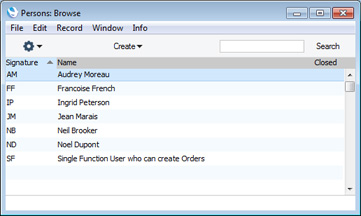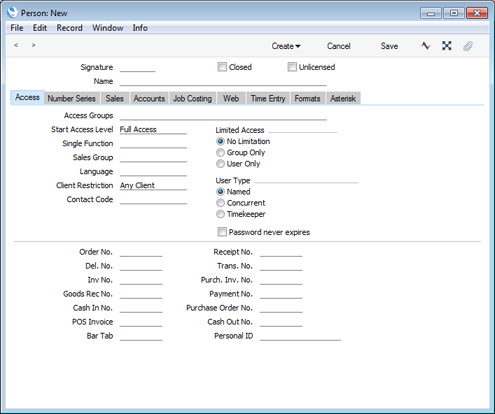Entering a Person Record
To open the Person register, ensure you are in the System module, then click the [Registers] button in the Navigation Centre. Then, double-click 'Persons' in the resulting list.
The 'Persons: Browse' window is opened, showing Persons that have already been entered.

From here, you can create Person records using two methods:
- Choose 'Named User' from the Create menu. This method will create a Named User with Mailbox and connected record in the Contact register. Please refer here for details about this method.
- Select 'New' from the Create menu in the Button Bar or use the Ctrl-N (Windows and Linux) or ⌘-N (Macintosh) keyboard shortcut. Alternatively, highlight a Person similar to the one you want to enter and select 'Duplicate' from the same menu. You will be able to choose whether the new record will be a Named or Concurrent User. If it will be a Named User, you will need to create their Mailbox and, if necessary, their connected record in the Contact register yourself.
If you use the 'New' or 'Duplicate' functions as described for the second method above, the 'Person: New' window will be opened, empty if you clicked [New] or containing a duplicate of the highlighted Person.

When the Person record is complete, save it using the [Save] button and close the window by clicking the close box. Remember to give the Person a
password and, in the case of a Named User, to create a
Mailbox for them, using the functions on the Operations and Create menus.
Since the amount of information stored about each Person will not fit on a single screen, the Person window has been divided into nine cards. At the top of each is the header. This contains the Person's Signature and Name. There are nine named buttons ('tabs') in the header.

By clicking the tabs you can navigate between the cards, and always go directly to a certain card. The header is always visible, so you can always see which Person you are working with.
Please click the following links for details about each card:
---
In this chapter:
Go back to:
